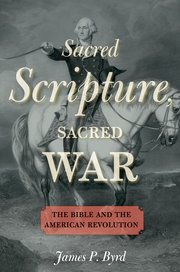Sacred Scripture, Sacred War

Sacred Scripture, Sacred War
James Byrd
Oxford University Press USA 2013
On January 17, 1776, one week after Thomas Paine published his incendiary pamphlet Common Sense, Connecticut minister Samuel Sherwood preached an equally patriotic sermon. “God Almighty, with all the powers of heaven, are on our side,” Sherwood said, voicing a sacred justification for war that Americans would invoke repeatedly throughout the struggle for independence.
In Sacred Scripture, Sacred War, James Byrd offers the first comprehensive analysis of how American revolutionaries defended their patriotic convictions through scripture. Byrd shows that the Bible was a key text of the American Revolution. Indeed, many colonists saw the Bible as primarily a book about war. They viewed God as not merely sanctioning violence but actively participating in combat, playing a decisive role on the battlefield. When war came, preachers and patriots alike turned to scripture not only for solace but for exhortations to fight. Such scripture helped amateur soldiers overcome their natural aversion to killing, conferred on those who died for the Revolution the halo of martyrdom, and gave Americans a sense of the divine providence of their cause. Many histories of the Revolution have noted the connection between religion and war, but Sacred Scripture, Sacred War is the first to provide a detailed analysis of specific biblical texts and how they were used, especially in making the patriotic case for war. Combing through more than 500 wartime sources, which include more than 17,000 biblical citations, Byrd shows precisely how the Bible shaped American war, and how war in turn shaped Americans’ view of the Bible.
Brilliantly researched and cogently argued, Sacred Scripture, Sacred War sheds new light on the American Revolution.
About the Author
James P. Byrd is Assistant Professor of American Religious History and Associate Dean for Graduate Education and Research at Vanderbilt University Divinity School and Graduate Department of Religion. He is the author of Jonathan Edwards for Armchair Theologians and The Challenges of Roger Williams.
Reviews
“With its remarkable research and deft insights, Sacred Scripture, Sacred War represents a major breakthrough in the study of religion and the American Founding. Never before have we had such a systematic investigation of how the Patriots actually used the Bible. Anyone interested in the Revolution will have to contend with Byrd’s book.” — Thomas S. Kidd, author of God of Liberty: A Religious History of the American Revolution
“Historians believe they know why Founders such as John Adams and Thomas Jefferson became revolutionaries, but the reasons why most common people supported the American Revolution, and were willing to fight and die for American independence, has remained something of an enigma. By studying how the Bible and the clergy inspired patriotism, historian James Byrd has provided answers that unravel some of the mystery. Byrd has written a good and important book that enriches our understanding of the American Revolution.” — John Ferling, author of Independence: The Struggle to Set America Free
“It is no secret that the Bible is the quintessential text in American political and cultural history. Its cadences soar in presidential addresses and in America’s greatest novels. Until recently, the central role the Bible has played in American wars has been less clear. Now, thanks to James Byrd, scholars have a thoroughly narrated index of the American Revolution that shows just how pervasive the Bible was to patriots pursuing their war for independence. Richly detailed and beautifully written, this book makes a major contribution to the literature on America’s religious destiny, which was forged in the travail of revolution.” — Harry S. Stout, author of The New England Soul: Preaching and Religious Culture in Colonial New England
Table of Contents
Introduction
Chapter 1: “The Curse of Cowardice”: The Martial Power of the Sermon
Chapter 2: “The Lord is a Man of War”: Moses, the Exodus, and the Spirit of ’76
Chapter 3: “Cursed Be He that Keepeth Back his Sword from Blood”: Deborah, Jeremiah, and Prophetic Violence
Chapter 4: “Teacheth My Hands to War, and My Fingers to Fight: David’s Revolutionary Heroism
Chapter 5: “The Liberty wherewith Christ hath Made Us Free”: Peter, Paul, and Apostolic Patriotism
Chapter 6: “The Fierceness and Wrath of Almighty God”: Revelation in the Revolution
Epilogue: An American Patriot’s Bible
Appendix: Methodology
Index
Notes